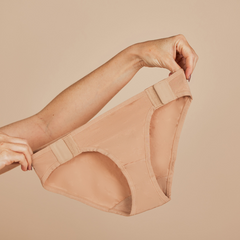You may find that your partnership changes with the onset of a disability, a change in your health, or a change in your physical abilities.
Sometimes people with disabilities say that aspects of their relationship with their significant other or spouse really strengthen after a change in health while also feeling like other areas of their relationship struggle. Typically, people with disabilities can require more support or they have to be more organized to get through the day than prior to the injury.
When a couple can find a groove that helps support each other and specifically the person with a disability, they can often feel like really good “teammates.” But “teammates” isn’t always romantic or sexual, and the logistics of a well oiled machine doesn’t always bolster the intimate connection between a couple.

So what are some ways you can prioritize and fuel the intimate relationship?
As an occupational therapist who specializes in sex and intimacy, I am always thinking about the doing, as in the activities that help foster a specific desired result. So below are some tangible and actionable activities that you may find help strengthen that connectedness, love, and desire towards your partner.
1. Communicate
Tell your partner when they’re on the right track. Everyone has ways they receive love best.
If you want to continue to receive love in specific ways, your partner has to know the specific things they do that make you feel good. Especially in long term relationships, couples can think things like “oh, he knows what I want.”
This might actually not be the case, and even if it is, it doesn’t hurt to reinforce it through appreciation. Your partner might provide caregiving, for example, assistance with your medication or help managing your medical appointment.
Appreciation for this is great, but also think about the things your partner does or you’d like them to do that reminds you of the romantic or intimate relationship. So for example, perhaps your partner always makes you coffee in the morning and brings it to you, tell them things like “this is why I love you,” or “Thank you for always bringing me coffee, it gets my day going great.”
Think about something your partner could do that would really bring you joy versus what they do to help you with the logistics of the day or managing your health. Communicate this to your partner and either thank them for it or ask them to do more of it.
2. Flirt
Couples can stop flirting for a lot of reasons.
You may feel flirting isn’t necessary anymore and is only important in the early phases of the relationship when you’re trying to attract your partner and vice versa. Or perhaps you might find that with the stress of health issues the lightness or playfulness of flirting feels ill timed or hard to do.
Another reason couples stop flirting is that one may feel that flirting is how sex is initiated and with a lack of desire for sex, flirting stops and stops being welcomed or reciprocated. Whatever the reason, flirting is a very powerful tool and action to fuel intimacy in the relationship.
Flirting is a way you can remind yourselves that you have a relationship beyond the “teammate” relationship and that despite the stress of disability, playfulness has a role in creating a relaxed connection with your partner. Have an understanding with your partner that flirtation is just for the fun of flirtation and that while it might lead to sex, it doesn’t have to.
Ask your partner some ways they like to be flirted with. Some ideas to start the conversation might be:
-
Flirtation through physical touch like a pinch, hug, grab, or hand hold
-
Flirtation through a complement like “that color looks great on you” or “Hey Sexy”
-
Flirtation through humor and making your partner laugh
Sometimes people flirt through teasing each other, but a good general rule of thumb is that this typically creates more distance than connection, so use teasing sparingly if not at all.
3. Do fun activities together
You might feel that due to your illness or disability, you end up spending a lot of time with your partner, but ask yourself is the time you’re spending together actually fun.
Think about infusing fun activities or experiences into your daily routine. Consider activities like watching a funny movie together, planning a virtual happy hour with friends who you don’t see often, playing a game, or learning something new together.
You don’t necessarily have to do the activities together. For example if one of you loves to cook, would it be fun for the other person to join you in the kitchen and talk to you?
4. Date
Couples can often place a high priority on dating in the beginning of their relationship as a way to get to know each other and spend time together when they don’t live together.
Dating can become deprioritized when people feel like they have other competing priorities that take precedence like parenting, caring for an elderly parent, working, multiple medical appointments, or navigating daily life living with a disability.
Additionally, you might find it difficult to physically access places in your community for dates. While acknowledging access barriers and the other competing priorities, you can still use dating as an activity that helps foster that emotional intimacy.
Going on a date is a great way to get some reprieve from some of the stressors and relax with your partner. Think about going on a date once or twice a month. Alternate who plans the date between you and your partner.
Additionally, you may need to adapt or change how you typically used to date due to your disability. The idea is to value the dating activity and stay solution oriented. Some suggestions to help with accessibility and encourage adaptability are:
-
Call ahead and ask if the location and bathroom meets your specific mobility needs.
-
If you love going to see concerts but find it difficult to stand in a crowd, consider watching live music at a bar or restaurant where there is seating, or buying a ticket for the seated area of a concert.
-
Are you most comfortable and relaxed at home? Have a date inside the home by doing something novel. For example, dress up and order take out from a new restaurant. Think about some of the items you use or things you do for “special occasions” and incorporate them into your date night at home.



